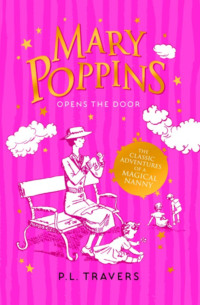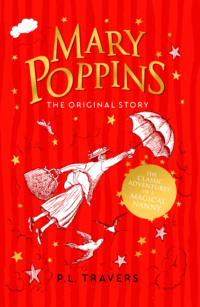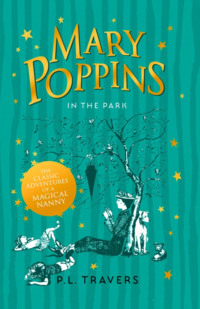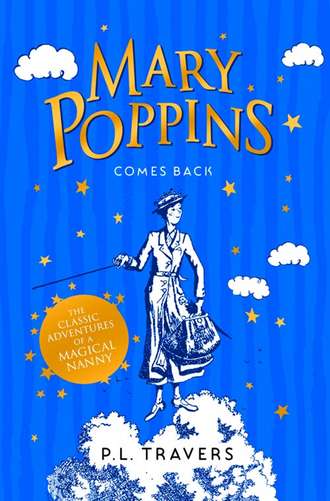
Полная версия
Mary Poppins Comes Back
“Daddy.”
“But his name is Mr Banks.”
“Yes, but his other name is George.”
Michael sighed.
“A month is an awfully long time, Jane, isn’t it?”
“Yes – four weeks and a bit,” said Jane, feeling that a month with Miss Andrew would seem more like a year.
Michael edged closer to her.
“I say –” he began in an anxious whisper, “she can’t really make them send Mary Poppins away, can she?”
“Odd!”
The word sounded behind them like an explosion.
They turned. Mary Poppins was gazing after Miss Andrew with a look that could have killed her.
“Odd!” she repeated, with a long-drawn sniff. “That’s not the word for her. Humph! I don’t know how to bring up children, don’t I? I’m impertinent, incapable, and totally unreliable, am I? We’ll see about that!”
Jane and Michael were used to threats from Mary Poppins, but today there was a note in her voice they had never heard before. They stared at her in silence, wondering what was going to happen.
A tiny sound, partly a sigh and partly a whisper, fell on the air.
“What was that?” said Jane quickly.
The sound came again, a little louder this time. Mary Poppins cocked her head and listened.
Again a faint chirping seemed to come from the doorstep.
“Ah!” cried Mary Poppins triumphantly. “I might have known it!”
And with a sudden movement, she sprang at the circular object Miss Andrew had left behind and tweaked off the cover.
Beneath it was a brass bird-cage, very neat and shiny. And sitting at one end of the perch, huddled between his wings, was a small, light-brown bird. He blinked a little as the afternoon light streamed down upon his head. Then he gazed solemnly about him with a round, dark eye. His glance fell upon Mary Poppins, and, with a start of recognition, he opened his beak and gave a sad, throaty, little cheep. Jane and Michael had never heard such a miserable sound.
“Did she, indeed? Tch, tch tch! You don’t say!” said Mary Poppins, nodding her head sympathetically.
“Chirp-irrup!” said the bird, shrugging its wings dejectedly.
“What? Two years? In that cage? Shame on her!” said Mary Poppins to the bird, her face flushing with anger.
The children stared. The bird was speaking in no language they knew, and yet here was Mary Poppins carrying on an intelligent conversation with him as though she understood.
“What is it saying—” Michael began.
“Sh!” said Jane, pinching his arm to make him keep quiet.
They stared at the bird in silence. Presently he hopped a little way along the perch towards Mary Poppins and sang a note or two in a low, questioning voice.
Mary Poppins nodded. “Yes – of course I know that field. Was that where she caught you?”
The bird nodded. Then he sang a quick, trilling phrase that sounded like a question.
Mary Poppins thought for a moment. “Well,” she said, “it’s not very far. You could do it in about an hour. Flying South from here.”
The bird seemed pleased. He danced a little on his perch and flapped his wings excitedly. Then his song broke out again, a stream of round, clear notes, as he looked imploringly at Mary Poppins.
She turned her head and glanced cautiously up the stairs.
“Will I? What do you think? Didn’t you hear her call me a Young Person? Me!” She sniffed disgustedly.
The bird’s shoulders shook as though he were laughing.
Mary Poppins bent down.
“What are you going to do, Mary Poppins?” cried Michael, unable to contain himself any longer. “What kind of a bird is that?”
“A Lark,” said Mary Poppins briefly, turning the handle of the little door. “You’re seeing a Lark in a cage for the first time – and the last!”
And as she said that, the door of the cage swung open. The Lark, flapping his wings, swooped out with a shrill cry and alighted on Mary Poppins’ shoulder.
“Humph!” she said, turning her head. “That’s an improvement, I should think?”
“Chirr-up!” agreed the Lark, nodding.
“Well, you’d better be off,” Mary Poppins warned him. “She’ll be back in a minute.”
At that the Lark burst into a stream of running notes, flicking his wings at her and bowing his head again and again.
“There, there!” said Mary Poppins gruffly. “Don’t thank me. I was glad to do it. I couldn’t see a Lark in a cage! Besides, you heard what she called me!”
The Lark tossed back his head and fluttered his wings. He seemed to be laughing heartily. Then he cocked his head to one side and listened.
“Oh, I quite forgot!” came a loud voice from upstairs. “I left Caruso outside. On those dirty steps. I must go and get him.”
Miss Andrew’s heavy-footed tread sounded on the stairs.
“What?” she called back in reply to some question of Mrs Banks. “Oh, he’s my Lark, my Lark, Caruso! I call him that because he used to be such a beautiful singer. What? No, he doesn’t sing at all now, not since I trapped him in a field and put him in a cage. I can’t think why.”
The voice was coming nearer, growing louder as it approached.
“Certainly not!” it called back to Mrs Banks. “I will fetch him myself. I wouldn’t trust one of those impudent children with him. Your banisters want polishing. They should be done at once.”
Tramp-tramp. Tramp-tramp. Miss Andrew’s steps sounded through the hall.
“Here she comes!” hissed Mary Poppins. “Be off with you.” She gave her shoulder a little shake.
“Quickly!” cried Michael anxiously.
“Oh, hurry!” said Jane.
With a quick movement the Lark bent his head and pulled out one of his wing feathers with his beak.
“Chirr-chirr-chirr-irrup!” he sang, and stuck the feather into the ribbon of Mary Poppins’ hat. Then he spread his wings and swept into the air.
At the same moment Miss Andrew appeared in the doorway.
“What?” she shouted, when she saw Jane and Michael and the Twins. “Not gone up to bed yet? This will never do. All well-brought-up children –” she looked balefully at Mary Poppins – “should be in bed by five o’clock. I shall certainly speak to your Father.”
She glanced round.
“Now, let me see. Where did I leave my—” She broke off suddenly. The uncovered cage, with its open door, stood at her feet. She stared down at it as though she were unable to believe her eyes.
“Why? When? Where? What? Who?” she spluttered. Then she found her full voice.
“Who took off that cover?” she thundered. The children trembled at the sound.
“Who opened that cage?”
There was no reply.
“Where is my Lark?”
Still there was silence as Miss Andrew stared from one child to another. At last her gaze fell accusingly upon Mary Poppins.
“You did it!” she cried, pointing her large finger. “I can tell by the look on your face! How dare you! I shall see that you leave this house tonight – bag and baggage! You impudent, impertinent, worthless—”
Chirp-irrup!
From the air came a little trill of laughter. Miss Andrew looked up. The Lark was lightly balancing on his wings just above the sunflowers.
“Ah, Caruso – there you are!” cried Miss Andrew. “Now come along! Don’t keep me waiting. Come back to your nice, clean cage, Caruso, and let me shut the door!”
But the Lark just hung in the air and went into peals of laughter, flinging back his head and clapping his wings against his side.
Miss Andrew bent and picked up the cage and held it above her head.
“Caruso – what did I say? Come back at once!” she commanded, swinging the cage towards him. But he swooped past it and brushed against Mary Poppins’ hat.
“Chirp-irrup!” he said, as he sped by.
“All right!” said Mary Poppins, nodding in reply.
“Caruso, did you hear me?” cried Miss Andrew. But now there was a hint of dismay in her loud voice. She put down the cage and tried to catch the Lark with her hands. But he dodged and flickered past her, and, with a lift of his wings, dived higher into the air.
A babble of notes streamed down to Mary Poppins.
“Ready!” she called back.
And then a strange thing happened.
Mary Poppins fixed her eyes upon Miss Andrew; and Miss Andrew, suddenly spellbound by that strange dark gaze, began to tremble on her feet. She gave a little gasp, staggered uncertainly forward and, with a thundering rush, she dashed towards the cage. Then – was it that Miss Andrew grew smaller or the cage larger? Jane and Michael could not be sure. All they knew for certain was that the cage door shut to with a little click and closed upon Miss Andrew.
“Oh! Oh! Oh!” she cried, as the Lark swooped down and seized the cage by the handle.
“What am I doing? Where am I going?” Miss Andrew shouted as the cage swept into the air.
“I have no room to move! I can hardly breathe!” she cried.
“Neither could he!” said Mary Poppins quietly.
Miss Andrew rattled at the bars of the cage.
“Open the door! Let me out, I say! Let me out!”
“Humph! Not likely,” said Mary Poppins in a low, scoffing voice.
On and on went the Lark, climbing higher and higher and singing as he went. And the heavy cage, with Miss Andrew inside it, lurched after him, swaying dangerously as it swung from his claw.
Above the clear song of the Lark, they heard Miss Andrew hammering at the bars and crying:
“I who was Well-Brought-Up. I who was Always Right. I who was Never Mistaken. That I should come to this!”
Mary Poppins gave a curious, quiet little laugh.
The Lark looked very small now, but still he circled upwards, singing loudly and triumphantly. And still Miss Andrew and her cage circled heavily after him, rocking from side to side, like a ship in a storm.
“Let me out, I say! Let me out!” Her voice came screaming down.
Suddenly the Lark changed his direction. His song ceased for a moment as he darted sideways. Then it began again, wild and clear, as, shaking the ring of the cage from his foot, he flew towards the South.
“He’s off!” said Mary Poppins.
“Where?” cried Jane and Michael.
“Home – to his meadows!” she replied, gazing upwards.
“But he’s dropped the cage!” said Michael, staring.
And well he might stare, for the cage was now hurtling downwards, lurching and tumbling, end over end. They could clearly see Miss Andrew, now standing on her head and now on her feet as the cage turned through the air. Down, down, it came, heavy as a stone, and landed with a plop on the top step.
With a fierce movement, Miss Andrew tore open the door. And it seemed to Jane and Michael as she came out that she was as large as ever and even more frightening.
For a moment she stood there, panting, unable to speak, her face purpler than before.
“How dare you!” she said in a throaty whisper, pointing a trembling finger at Mary Poppins. And Jane and Michael saw that her eyes were no longer angry and scornful, but full of terror.
“You – you—” stammered Miss Andrew huskily, “you cruel, disrespectful, unkind, wicked, wilful girl – how could you, how could you?”
Mary Poppins fixed her with a look. From half-closed eyes, she gazed revengefully at Miss Andrew for a long moment.
“You said I didn’t know how to bring up children,” she said, speaking slowly and distinctly.
Miss Andrew shrank back, trembling with fear.
“I – I apologise,” she said, gulping.
“That I was imprudent, incapable and totally unreliable,” said Mary Poppins.
“It was a mistake. I – I’m sorry,” Miss Andrew stammered.
“That I was a Young Person!” continued Mary Poppins remorselessly.
“I take it back,” panted Miss Andrew. “All of it. Only let me go. I ask nothing more.” She clasped her hands and gazed at Mary Poppins imploringly.
“I can’t stay here,” she whispered. “No! No! Not here! Let me go!”
Mary Poppins gazed at her, long and thoughtfully. Then, with a little outward movement of her hand – “Go!” she said.
Miss Andrew gave a gasp of relief. “Oh, thank you! Thank you!” Still keeping her eyes fixed on Mary Poppins, she staggered backwards down the steps. Then she turned and went stumbling unevenly down the garden path.
The Taxi-man, who all this time had been unloading the luggage, was starting up his engine and preparing to depart.
Miss Andrew held up a trembling hand.
“Wait!” she cried brokenly. “Wait for me. You shall have a Ten-shilling note for yourself if you will drive me away at once.”
The man stared at her.
“I mean it!” she said urgently. “See,” she fumbled feverishly in her pocket, “here it is. Take it – and drive on!”
Miss Andrew tottered into the cab and collapsed upon the seat.
The Taxi-man, still gaping, closed the door upon her.
Then he began hurriedly re-loading the luggage. Robertson Ay had fallen asleep across a pile of trunks, but the Taxi-man did not stop to wake him. He swept him off on to the path and finished the work himself.
“Looks as though the ’ole girl ’as ’ad a shock! I never saw anybody take on so. Never!” he murmured to himself as he drove off.
But what kind of a shock it was the Taxi-man did not know and, if he lived to be a hundred, could not possibly guess …
“Where is Miss Andrew?” said Mrs Banks, hurrying to the front door in search of the visitor.
“Gone!” said Michael.
“What do you mean – gone?” Mrs Banks looked very surprised.
“She didn’t seem to want to stay,” said Jane.
Mrs Banks frowned.
“What does this mean, Mary Poppins?” she demanded.
“I couldn’t say, m’m, I’m sure,” said Mary Poppins calmly, as though the matter did not interest her. She glanced down at her new blouse and smoothed out a crease.
Mrs Banks looked from one to the other and shook her head.
“How very extraordinary! I can’t understand it.”
Just then the garden gate opened and shut with a quiet little click. Mr Banks came tip-toeing up the path. He hesitated and waited nervously on one foot as they all turned towards him.
“Well? Has she come?” he said anxiously, in a loud whisper.
“She has come and gone,” said Mrs Banks.
Mr Banks stared.
“Gone? Do you mean – really gone? Miss Andrew?”
Mrs Banks nodded.
“Oh, joy, joy!” cried Mr Banks. And seizing the skirts of his waterproof in both hands, he proceeded to dance the Highland Fling in the middle of the path. He stopped suddenly.
“But how? When? Why?” he asked.
“Just now – in a taxi. Because the children were rude to her, I suppose. She complained to me about them. I simply can’t think of any other reason. Can you, Mary Poppins?”
“No, m’m, I can’t,” said Mary Poppins, brushing a speck of dust off her blouse with great care.
Mr Banks turned to Jane and Michael with a sorrowful look on his face.
“You were rude to Miss Andrew? My Governess? That dear old soul? I’m ashamed of you both – thoroughly ashamed.” He spoke sternly, but there was a laughing twinkle in his eyes.
“I’m a most unfortunate man,” he went on, putting his hands into his pockets. “Here am I slaving day-in and day-out to bring you up properly, and how do you repay me? By being rude to Miss Andrew! It’s shameful. It’s outrageous! I don’t know that I shall ever be able to forgive you. But –” he continued, taking two sixpences out of his pocket and solemnly offering one to each of them – “I shall do my best to forget!”
He turned away smiling.
“Hullo!” he remarked, stumbling against the bird-cage. “Where did this come from? Whose is it?”
Jane and Michael and Mary Poppins were silent.
“Well, never mind,” said Mr Banks. “It’s mine now. I shall keep it in the garden and train my sweet peas over it.”
And he went off, carrying the bird-cage and whistling very happily …
“Well,” said Mary Poppins sternly, as she followed them into the Nursery, “this is nice goings on, I must say. You behaving so rudely to your Father’s guest.”
“But we weren’t rude!” Michael protested. “I only said she was a Holy Terror and he called her that himself.”
“Sending her away like that when she’d only just come – don’t you call that rude?” demanded Mary Poppins.
“But we didn’t,” said Jane. “It was you—”
“I was rude to your Father’s guest?” Mary Poppins, with her hands on her hips, eyed Jane furiously. “Do you dare to stand there and tell me that?”
“No, no! You weren’t rude, but—”
“I should think not, indeed!” retorted Mary Poppins, taking off her hat and unfolding her apron. “I was properly brought up!” she added sniffing, as she began to undress the Twins.
Michael sighed. He knew it was no use arguing with Mary Poppins.
He glanced at Jane. She was turning her sixpence over and over in her hand.
“Michael!” she said. “I’ve been thinking.”
“What?”
“Daddy gave us these because he thought we sent Miss Andrew away.”
“I know.”
“And we didn’t. It was Mary Poppins!”
Michael shuffled his feet.
“Then you think—” he began uneasily, hoping she didn’t mean what he thought she meant.
“Yes, I do,” said Jane, nodding.
“But – but I wanted to spend mine.”
“So do I. But it wouldn’t be fair. They’re hers, really.”
Michael thought about it for a long time. Then he sighed.
“All right,” he said regretfully, and took his sixpence out of his pocket.
They went together to Mary Poppins.
Jane held out the coins.
“Here you are!” she said breathlessly, “we think you should have them.”
Mary Poppins took the sixpences and turned them over and over on her palm – heads first and then tails. Then her eye caught theirs and it seemed to them that her look plunged right down inside them and saw what they were thinking. For a long time she stood there, staring down into their thoughts.
“Humph!” she said at last, slipping the sixpences into her apron pocket. “Take care of the pennies and the pounds will take care of themselves.”
“I expect you’ll find them very useful,” said Michael, gazing sadly at the pocket.
“I expect I shall,” she retorted tartly, as she went to turn on the bath …
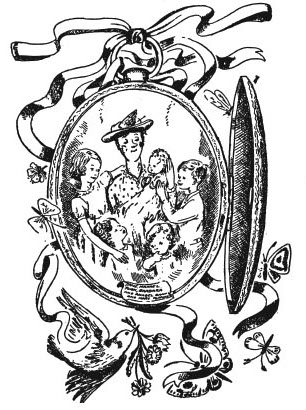
Chapter Three
BAD WEDNESDAY
TICK-TACK! TICK-TOCK!
The pendulum of the Nursery clock swung backwards and forwards like an old lady nodding her head.
Tick-tack! Tick-tock!
Then the clock stopped ticking and began to whir and growl, quietly at first, and then more loudly, as though it were in pain. And as it whirred it shook so violently that the whole mantelpiece trembled. The empty Marmalade Jar hopped and shook and shivered; John’s hair-brush, left there over-night, danced on its bristles; the Royal Doulton Bowl that Mrs Banks’ Great-Aunt Caroline had given her as a Christening Present slipped sideways, so that the three little boys who were playing horses inside it stood on their painted heads.
And after all that, just when it seemed as if the clock must burst, it began to strike.
One! Two! Three! Four! Five! Six! Seven!
On the last stroke Jane woke up.
The sun was streaming through a gap in the curtains and falling in gold stripes upon her quilt. Jane sat up and looked round the Nursery. No sound came from Michael’s bed. The Twins in their cots were sucking their thumbs and breathing deeply.
“I’m the only one awake,” she said, feeling very pleased. “I can lie here all by myself and think and think and think.”
And she drew her knees up to her chin and curled into the bed as though she were settling down into a nest.
“Now I am a bird!” she said to herself. “I have just laid seven lovely white eggs, and I am sitting with my wings over them, brooding. Cluck-cluck! Cluck-cluck!”
She made a small, broody noise in her throat.
“And after a long time, say half an hour, there will be a little cheep, and a little tap and the shells will crack. Then, out will pop seven little chicks, three yellow, two brown, and two—”
“Time to get up!”
Mary Poppins, appearing suddenly from nowhere, tweaked the bedclothes from Jane’s shoulders.
“Oh, no, no!” grumbled Jane, pulling them up again.
She felt very cross with Mary Poppins for rushing in and spoiling everything.
“I don’t want to get up!” she said, turning her face into the pillow.
“Oh, indeed?” Mary Poppins said calmly, as though the remark had no interest for her. She pulled the bedclothes right off the bed and Jane found herself standing on the floor.
“Oh, dear,” she grumbled, “why do I always have to get up first?”
“You’re the eldest – that’s why!” Mary Poppins pushed her towards the bathroom.
“But I don’t want to be the eldest. Why can’t Michael be the eldest sometimes?”
“Because you were born first – see?”
“Well, I didn’t ask to be. I’m tired of being born first. I wanted to think.”
“You can think when you’re brushing your teeth.”
“Not the same thoughts.”
“Well, nobody wants to think the same thoughts all the time.”
“I do.”
Mary Poppins gave her a quick, black look.
“That’s enough, thank you!” And, from the tone of her voice, Jane knew she meant what she said.
Mary Poppins hurried away to wake Michael.
Jane put down her toothbrush and sat on the edge of the bath.
“It’s not fair,” she grumbled, kicking the linoleum with her toes. “Making me do all the horrid things just because I’m the eldest! I won’t brush my teeth!”
Immediately she felt surprised at herself. She was usually quite glad to be older than Michael and the Twins. It made her feel rather superior and much more important. But today – what was the matter with today that she felt so cross and peevish?
“If Michael had been born first I’d have had time to hatch out my eggs!” she grumbled to herself, feeling that the day had begun badly.
Unfortunately, instead of getting better, it grew worse.
At breakfast, Mary Poppins discovered there was only enough Puffed Rice for three.
“Well, Jane must have Porridge,” she said, setting out the plates and sniffing angrily, for she did not like making Porridge; there were always too many lumps in it.
“But why?” complained Jane. “I want Puffed Rice.”
Mary Poppins darted a fierce look at her.
“Because you’re the eldest!”
There it was again. That hateful word. She kicked the leg of her chair under the table, hoping she was scratching off the varnish, and ate her Porridge as slowly as she dared. She turned it round and round in her mouth, swallowing as little as possible. It would serve everybody right if she starved to death. Then they’d be sorry.
“What is today?” enquired Michael cheerfully, scraping up the last of his Puffed Rice.
“Wednesday,” said Mary Poppins. “Leave the pattern on the plate, please!”
“Then it’s today we’re going to tea with Miss Lark!”
“If you’re good,” said Mary Poppins darkly, as though she did not believe such a thing was possible.



